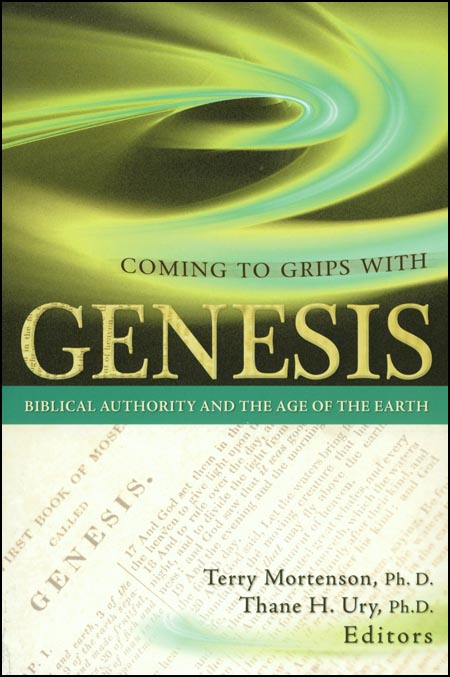 |
Book Review by WordExplain |
"In the
beginning God created the heavens and the earth." Genesis
1:1
"For in six days the
LORD made the heavens and the earth, the sea and
all that is in them, and rested on the seventh day; therefore the LORD
blessed the sabbath day and made it holy." Exodus
20:11
|
                   |
Coming to Grips with Genesis:
Biblical Authority and the Age of the Earth
Chapter 1: The Church Fathers on
Genesis, the Flood, and the Age of the Earth.
Written by James R. Mook, Th.M.; Th.D. The Age of the Earth
What is important about the views of the "Church Fathers" in relation to Genesis 1-11? The justification is that these men were closest chronologically to Christ and the Apostles. Thus, presumably, their views on any given topic ought to influence our view of what Christ and the Apostles taught. On the subject of the events of Genesis 1-11, there are those who would call themselves "Evangelical" who maintain that a significant number of the Church Fathers had views that are compatible with a "deep time" age of the universe. According to James Mook, Scholars like William G.T. Shedd
believe some in the patristic era taught the day-age theory. Henri
Blocher claims Augustine held to a framework type view. Arthur Custance
finds a champion of the gap theory in Origen. (p. 24).
Mook continued, "Thus, like Shedd, Blocher, and Custance, [Hugh] Ross makes an attempt to buttress his old-earth position with some patristic clout." (p. 25). But an accurate assessment of the Church Fathers does not support their claim. According to Mook (p. 29): The fathers favored a
sudden, not a gradual, creation. Literalists specified that the six
days of creation were each 24 hours long. Allegorists, like Clement,
Origen, and Augustine, did not consider the days of creation as 24-hour
days, but, even as old-earth advocate Davis Young states, neither did
they see non-literal days conflicting with their young-earth view.
Another statement by Mook (p. 38): Contrary to the
impression left by Hugh Ross and others, consideration of the fathers'
views of the length of the days of creation leads to the conclusion
that the Church fathers were young-earth creationists.
He proceeded to list individuals and writings that demonstrated belief in a young earth. Included in his list were the Epistle of Barnabas (AD 130-131); Irenaeus (AD 130-202 or 212); Hippolytus; Victorinus of Pettau; Methodius (AD 260-312); and Lactantius (pp. 41-45). The Reality of Noah's Global Flood
Justin Martyr agreed with a global flood (p. 49). Theophilus (115-185 AD) rejected the views of Plato, along with Greek fables promoting a second flood of epic proportions. He refers to Moses' account "the history of the deluge" (p. 49). Tertullian (A.D. 115-222) referred to the deluge as "that world-wide calamity, the abolisher of all things" (p. 49). Gregory of Nazianzus (A.D. 329-389) supported Noah's Flood (pp. 49-50). Augustine believed in a world-wide flood (p. 50). Mook's Conclusion
(These Points Reproduced Verbatim)
1. The fathers wrote in an intellectual milieu that was filled with naturalistic cosmogonies, most of which held the earth to be either very old or eternal. The fathers considered these thinkers to be atheistic, even if the philosophers posited an intelligent cause, because they did not believe in the God of the Bible. 2. Most of the fathers countered the naturalistic theories of origins of their day with the authoritative scriptural account of creation. The Alexandrians allowed for more use of scientific studies, but they still saw Scripture as having the final say on their view of the divine act of creation. 3. We have shown that most of the fathers held to the six days as being literal 24-hour days. At the very minimum, they all believed that creation was sudden. In strong contrast to the claims of Hugh Ross, we have demonstrated that no father proposed anything that could be taken as affirming deep time. It does not follow logically that if a father did not specify the exact length of each creation day, or even treated them as purely symbolic, then he would not see the time frame of creation as being important, or that deep time was a viable option. The oft-used counter examples of Clement, Origen, and Augustine, best understood through the lens of Alexandrian allegorical hermeneutics, all held that the creation had been fully completed in an instant. 4. Regardless of their differing hermeneutical approaches to Genes 1, the fathers held to the sex/septa-millenary typological eschatology of the six days. The tradition among the fathers was that the creation occurred less than 6,000 years in the past, and the world would end or dramatically change at the Second Advent, which would occur at the end of the 6,000 years. 5. The fathers asserted that the Flood in Genesis 6-8 was worldwide in extent, and some held that the existence of fossils was evidence of this cataclysm. 6. The fathers were young-earth creationists. 7. The fathers were not striving for novelty. They merely saw their task as culling from, accentuating, and preserving ancient apostolic orthodoxy. Contact: jbartsch@wordexplain.com
|
